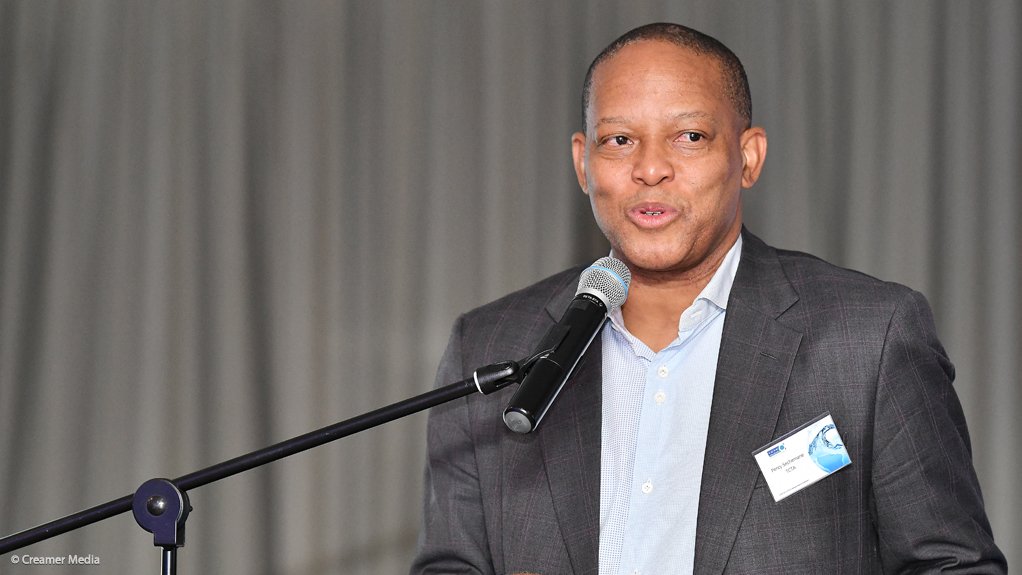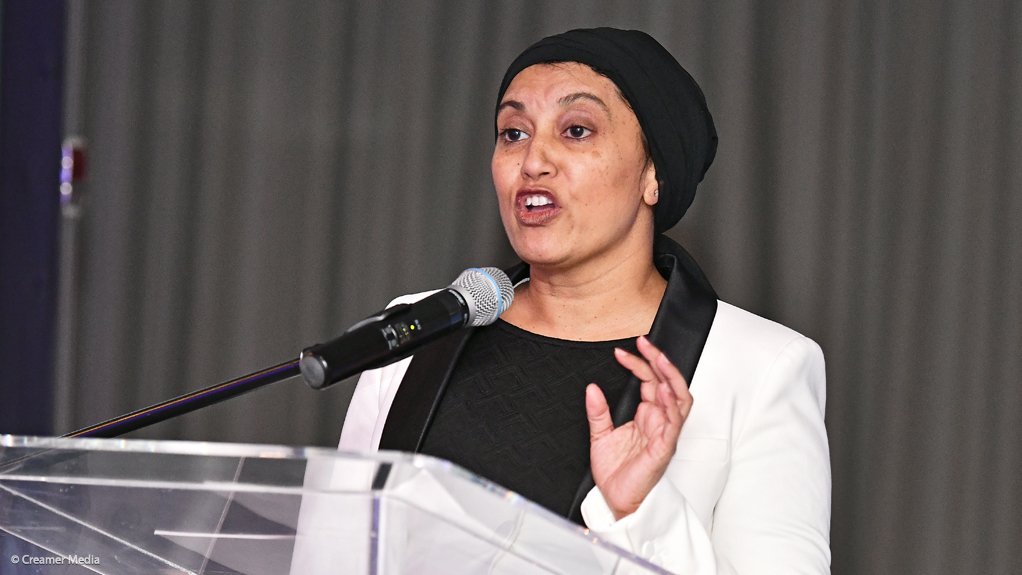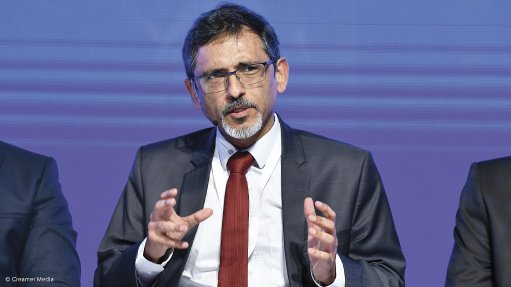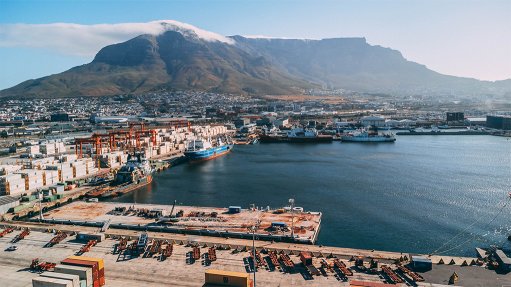TCTA intends to expand its horizons



Recently appointed TCTA CEO Percy Sechemane
Photo by Dylan Slater
TCTA CFO Halima Nazeer
Photo by Dylan Slater
Motivated by the idea of making an optimal contribution within the South African water sector, State-owned Trans-Caledon Tunnel Authority (TCTA) on Thursday reaffirmed its plans to explore ways in which it could expand its horizons and capacitate the organisation for the challenges the water sector will present in the next five years.
As part of these plans, the TCTA has adopted a vision for 2022, which is to be achieved through portfolio growth, operational excellence and an expansion in initiatives aimed at socioeconomic transformation.
In essence, the future portfolio will contain fewer surface water projects and more acid mine drainage (AMD), desalination and water reuse projects.
Recently appointed CEO Percy Sechemane on Thursday said the “future of building big dams is nearing an end”.
The future now lies in investing in alternative water sources, like desalination, he told attendees at the launch of the company’s annual report.
However, Sechemane highlighted that the TCTA had a 37%, or about R333-billion, funding gap. Currently, the Department of Water and Sanitation- (DWS-) led parastatal has a funding requirement of R899-billion, of which only R566-billion is available.
For the financial year ended March 31, TCTA was successful in achieving its strategic financial goals, which included raising finance for infrastructure projects, on behalf of the DWS, that would be recovered through user tariffs.
TCTA’s tariffs receivable, which represents it entitlement to recover the project costs incurred for the funding, construction and implementation of national water infrastructure, saw an increase to R28.9-billion, from R27.1-billion in the prior financial year, TCTA CFO Halima Nazeer said.
Future cash flows for capital expenditure, she added, have increased from prior year projections.
Cash inflows from operating activities for the year are higher than for the 2017 financial year period, predominantly owing to higher receipts of revenues and netted of by lower recoveries on fiscally funded projects.
“The higher receipts were partly due to the repayment of the outstanding balance for the 2016/17 financial year. The total receipts for the 2017/18 financial year amounted to R6.2-billion, of which R2.5-billion related to the 2016/17 outstanding balance,” she explained.
While the TCTA tariff billing for the current financial year was higher than the previous, owing to increased volumes, Nazeer said cash receipts for the year were not adequate to reduce the DWS’s outstanding balance.
The DWS debtors’ balance increased from R2.5-billion in 2016/17, to R3.2-billion in the current year.
Total cash outflows increased for the year, compared with outflows for the previous year, as a result of increased capital repayments.
Cash paid to suppliers, Nazeer noted, increased mainly as a result of the increase in AMD operations and maintenance, as all three basins were being operated in the current financial year.
The increase in other TCTA operational costs is as a result of a provision for doubtful debts that were raised in the current year, she added.
Construction costs, meanwhile, have decreased overall, with the main contributor to this year’s spend being the work in progress for Lesotho Highlands Water Project (LHWP) Phase 2.
Earlier this month, Engineering News Online reported that advance infrastructure construction at Polihali and Katse, which forms part of the LHWP Phase 2, is set to begin in early January, following the award of a contract, valued at about 394-million Lesotho Maloti, to the WBHO and LSP Construction joint venture.
At Polihali, where the Phase 2 Polihali dam is to be built, the scope of work includes earthworks and the creation of platforms for buildings, water and wastewater systems, landfill, roads, drainage, electrical and telecommunications networks.
LHWP Phase 2 builds on the successful completion of Phase 1 in 2003 which delivers water to the Gauteng region of South Africa and uses the water delivery system to generate hydroelectricity for Lesotho.
Phase 2 will increase the current supply rate of 780-million cubic metres a year incrementally to more than 1 270-million cubic metres a year.
Further, Nazeer said the treaty-related costs increased by 24% as a result of increases in royalties paid and operating costs for works in Lesotho.
Remuneration-related costs, she added, have remained within 5% of total outflows as only 2% of the total payments were made towards remuneration.
As at March 31, the overall debt outstanding decreased by nearly R1.6-billion, and is reflected at an overall balance of R27-billion compared with the balance at March 31, 2017, of R29-billion.
Comments
Press Office
Announcements
What's On
Subscribe to improve your user experience...
Option 1 (equivalent of R125 a month):
Receive a weekly copy of Creamer Media's Engineering News & Mining Weekly magazine
(print copy for those in South Africa and e-magazine for those outside of South Africa)
Receive daily email newsletters
Access to full search results
Access archive of magazine back copies
Access to Projects in Progress
Access to ONE Research Report of your choice in PDF format
Option 2 (equivalent of R375 a month):
All benefits from Option 1
PLUS
Access to Creamer Media's Research Channel Africa for ALL Research Reports, in PDF format, on various industrial and mining sectors
including Electricity; Water; Energy Transition; Hydrogen; Roads, Rail and Ports; Coal; Gold; Platinum; Battery Metals; etc.
Already a subscriber?
Forgotten your password?
Receive weekly copy of Creamer Media's Engineering News & Mining Weekly magazine (print copy for those in South Africa and e-magazine for those outside of South Africa)
➕
Recieve daily email newsletters
➕
Access to full search results
➕
Access archive of magazine back copies
➕
Access to Projects in Progress
➕
Access to ONE Research Report of your choice in PDF format
RESEARCH CHANNEL AFRICA
R4500 (equivalent of R375 a month)
SUBSCRIBEAll benefits from Option 1
➕
Access to Creamer Media's Research Channel Africa for ALL Research Reports on various industrial and mining sectors, in PDF format, including on:
Electricity
➕
Water
➕
Energy Transition
➕
Hydrogen
➕
Roads, Rail and Ports
➕
Coal
➕
Gold
➕
Platinum
➕
Battery Metals
➕
etc.
Receive all benefits from Option 1 or Option 2 delivered to numerous people at your company
➕
Multiple User names and Passwords for simultaneous log-ins
➕
Intranet integration access to all in your organisation




















